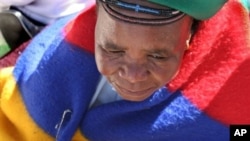JOHANNESBURG —
Marching on Pretoria's Union Buildings in protest of marginalization and mistreatment under apartheid in 1956, 20,000 women chanted a rallying cry proclaiming strength and determination, "Wathint'Abafazi Wathint'imbokodo!" ("Now you have touched the women, you have struck a rock!").
Since then, women throughout the country have come a long way, except for one place: at home.
According to figures recently issued by Deputy President Kgalema Motlanthe, ninety percent of South African women have experienced emotional and physical abuse; seventy-one percent have experienced sexual abuse; as many as five out of seven children are abused.
The modern version of the rallying cry for equality is particularly apt given today's epidemic level of domestic abuse: "When you strike a woman, you strike a rock!"
Having spent two years working at a shelter in Gauteng Province, social worker Marihet Infantino has been steeled by exposure to the front line of South Africa's battle againast domestic abuse.
Regardless of her resolve, however, some cases cannot be forgotten. One involved Anne, a mother of two young girls. All three had been sexually and physically abused by Anne’s husband, who constantly husband tried to find them and even sent threatening letters through his lawyer.
“Physically broken down, physically also abused," she says of Anne. "How this guy was able to take her down to nothing.... this lady, she cried, like, continuously.”
Although Anne and her children escaped the abuse — a rarity — Infantino calls the result devastating. South Africa’s violent history — its patriarchal society and pervasive poverty — contribute to the prevalence of abuse. Infantino estimates that only two out 10 women who come to the shelter end up leaving their situations.
“The insight that all these men have in their own behavior is nothing," she says. "There’s no insight. A lot of them don’t see that they have any role to play in the abuse, they don’t see any wrongdoing as well.”
Trust Law poll
Fortunately, the pattern of abuse is visible to some. South Africa this year ranked 16th place in a Trust Law poll ranking the best and worst G20 nations for women. India ranked last place in the poll, because of its trends of infanticide, child marriage and slavery.
Although South Africa's progressive constitution includes anti-abuse laws, legal researcher Mpiwa Mangwiro of Johannesburg's Tshwaranang Legal Advocacy Center says documents do not always translate into action.
"Much as we have the perfect legal instruments — we have our domestic violence act, our sexual offenses act, the national instructions — the challenge that we have is in implementation," she says, explaining that the government’s statistics may inaccurately low.
In the past five months, says Mangwiro, her center has seen nearly 115 women, most of them for abuse cases.
“It certainly hasn’t been getting any better," she says. "More and more cases are still being lost out at court, they're still not being prosecuted, there’s a lot of miscarriage of justice.”
For women left vulnerable by laws that go unenforced, taking shelter from abusers may be the best they can do. While social workers such as Infantino cite a paucity of resources — she has made calls for more shelters, more policemen, more trained staff at hospitals and, above all, better education about abuse — Mangwiro says the advocacy center maintains a wealth of determination to triumph legally and morally over the abusers.
“I would still tell them that the one thing they should never underestimate is the voice of women and the power of women," says Mangwiro.
In other words: When you strike a woman, you strike a rock.
Since then, women throughout the country have come a long way, except for one place: at home.
According to figures recently issued by Deputy President Kgalema Motlanthe, ninety percent of South African women have experienced emotional and physical abuse; seventy-one percent have experienced sexual abuse; as many as five out of seven children are abused.
The modern version of the rallying cry for equality is particularly apt given today's epidemic level of domestic abuse: "When you strike a woman, you strike a rock!"
Having spent two years working at a shelter in Gauteng Province, social worker Marihet Infantino has been steeled by exposure to the front line of South Africa's battle againast domestic abuse.
Regardless of her resolve, however, some cases cannot be forgotten. One involved Anne, a mother of two young girls. All three had been sexually and physically abused by Anne’s husband, who constantly husband tried to find them and even sent threatening letters through his lawyer.
“Physically broken down, physically also abused," she says of Anne. "How this guy was able to take her down to nothing.... this lady, she cried, like, continuously.”
Although Anne and her children escaped the abuse — a rarity — Infantino calls the result devastating. South Africa’s violent history — its patriarchal society and pervasive poverty — contribute to the prevalence of abuse. Infantino estimates that only two out 10 women who come to the shelter end up leaving their situations.
“The insight that all these men have in their own behavior is nothing," she says. "There’s no insight. A lot of them don’t see that they have any role to play in the abuse, they don’t see any wrongdoing as well.”
Trust Law poll
Fortunately, the pattern of abuse is visible to some. South Africa this year ranked 16th place in a Trust Law poll ranking the best and worst G20 nations for women. India ranked last place in the poll, because of its trends of infanticide, child marriage and slavery.
Although South Africa's progressive constitution includes anti-abuse laws, legal researcher Mpiwa Mangwiro of Johannesburg's Tshwaranang Legal Advocacy Center says documents do not always translate into action.
"Much as we have the perfect legal instruments — we have our domestic violence act, our sexual offenses act, the national instructions — the challenge that we have is in implementation," she says, explaining that the government’s statistics may inaccurately low.
In the past five months, says Mangwiro, her center has seen nearly 115 women, most of them for abuse cases.
“It certainly hasn’t been getting any better," she says. "More and more cases are still being lost out at court, they're still not being prosecuted, there’s a lot of miscarriage of justice.”
For women left vulnerable by laws that go unenforced, taking shelter from abusers may be the best they can do. While social workers such as Infantino cite a paucity of resources — she has made calls for more shelters, more policemen, more trained staff at hospitals and, above all, better education about abuse — Mangwiro says the advocacy center maintains a wealth of determination to triumph legally and morally over the abusers.
“I would still tell them that the one thing they should never underestimate is the voice of women and the power of women," says Mangwiro.
In other words: When you strike a woman, you strike a rock.





